Parashurama Marches to Hastinapur
The news about an impending war between the Kauravas and Pandavas spread to every nook and corner of Bharatvarsh. Kings, tribe leaders, and even commoners took sides.
In the village of Sonprastha, the usual humdrum of life had come to a standstill for a few weeks now. The young men were all either already in or getting ready to travel to Hastinapur, awaiting enlistment.
The women, the old, and the infirm lived with worry and fear, wondering if their breadwinners would return or die on the battlefield. Even the liveliness of children was dulled, thanks to a pall of gloom that fell like a heavy blanket over Sonprastha, nay, over the entire Bharatvarsha.
“Who will win, I wonder?”
“The Kauravas have a far larger army than the Pandavas. I’m certain they will win the war.”
“No! No! They don’t have Krishna, the King of Dwarka, by their side. He favours the Pandavas, who will be the ultimate winners.”
“Did you know that Krishna is believed to be an avatar of Mahavishnu? He has come down to finish Parashurama’s work.”
“You mean THE Parashurama, the Immortal who was born to rid Mother Earth of evil Kshatriyas whose increasing powers had gone to their heads?”
“Yes, the very same one who got the title Parashu from Lord Shiva himself, from whom he learned the art of fighting and the use of weaponry. In fact, Lord Shiva gave him a Rudramsha, a part of Himself, at the end of the training, thereby granting him immortality”
The two elderly men of Sonprastha were discussing the situation under the huge banyan tree at the centre of the village when they suddenly spied a group of sages passing by. The two of them rose to their feet and bowed reverentially to the sages, who blessed them, and went on their way.
The men didn’t realise that one of the sages was Parashurama himself, who was walking to Hastinapur to find out more about the impending war. He was happy they didn’t recognise him. He was too preoccupied with his own thoughts to answer their questions about himself and his life, which they would have had if they had recognised him. The sages acknowledged the pranams of the men and went on their way.
As they approached Hastinapur, Parashurama excused himself from the group and took a route leading to the city, while the others continued deeper into the jungle, away from the city.
The road to Hastinapur was crowded, with the hustle and bustle of people moving towards an event expected to leave an indelible mark on humanity, not just on the participating warriors and clans. The surging crowds, all moving towards the war, increased Parashurama’s worry, as he walked hurriedly, his head bent low.
I should reason with Duryodhana. This war should not happen! It would be disastrous.
Parashurama Meets Krishna
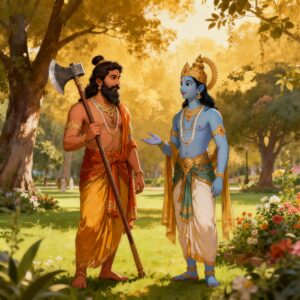
Suddenly, a beautifully decorated chariot stopped near him, and the sound of his name being called broke into his thoughts.
“Lord Parashurama!”
He looked up and found himself staring into the smiling eyes of Krishna, the Lord of Dwarka. Parashurama’s eyes lit up, too.
“Krishna! What a surprise! What are you doing here at Hastinapur? Shouldn’t you be with the Pandavas, preparing them and their allies for the war?”
Krishna alighted from the chariot, approached Parashurama, and bent down to touch the wise, old sage’s feet. Parashurama blessed him and said, “May you emerge victorious in all your endeavours!”
Krishna lifted himself up and invited Parashurama to ride with him in his chariot. They rode together for a while until they reached a green, secluded park where they alighted. Leaving the charioteer behind, the two men started walking in the park.
“So, what brings you to Hastinapur, Krishna?” The sage repeated the question.
“The same thing that brings you here, Lord Parashurama. One final attempt to stop the war!”
Parashurama’s face filled with joy at these words.
“Aah! Then I can hope! If you have come to talk peace, then the Kuru elders are bound to listen to you. There is a high chance that the war may not take place.”
Krishna’s eyes clouded. “I only wish your words come true, sire. But you know Duryodhana. He’s stubborn, and his father, King Dhritarashtra, loves him blindly. Moreover, we both know their time on earth has come. Therefore, I’m uncertain of the success of my peace attempt. But it is my duty to try one last time.”
“You mustn’t give up easily, Krishna. Peace at all costs is the most important thing now.”
“I’m surprised at your insistence on peace, Lord Parashurama. Aren’t you the one who killed Kshatriyas, promising to wipe them out, going on a merciless, pitiless rampage twenty-one times?”
The old man smiled and replied, “You are taunting me, Krishna. You know the number 21 is a hyperbole. Yes, I did go on a violent rampage. Remember, like you, I was born from Lord Vishnu for this very purpose. You know how arrogant, vain, and therefore, mercilessly violent Karthaveeryarjuna had become. Remember how he murdered my father, Sage Jamadagni, before kidnapping our dear Kamadhenu, the wish-bestowing cow. Remember his complete lack of guilt or fear for the consequences of his actions. Shouldn’t a thorn be removed by a thorn only?”
“Indeed, we are both an amsha of Lord Vishnu. Yet, why go on a rampage after killing the main Kshatriya responsible for your family’s destruction?” Krishna asked.
“Because he was the epitome of a warrior, but one that shouldn’t be a leader. Many warriors were misled by him and his representation of a Kshatriya. When I killed him, his blind followers thought he should be avenged. Or, at least, we must all strive to become like him, strong, powerful, they told themselves. They forgot that Kshatriya dharma was about defending the weak and keeping kingdoms safe from invaders and marauders. What happens if the rulers become the invaders? Shouldn’t they get the same treatment as the “hero” they believed in?”
“Also, my dear Krishna, I didn’t target the entire Kshatriya clan. I only worked my violence on the ones who swayed from the path of their dharma. You know I didn’t touch the Raghuvanshi clan, Mithila’s warriors, or the descendants of King Bharat. I only sought and brought out the unjust, cruel, and adharmic Kshatriyas. In fact, my primary targets were the Haihaya Clan, who had spread indiscriminate fear and injustice throughout their lands, thanks to their greed and misplaced sense of privilege.”
“I know that, Lord Parashurama. I also know you trained many Kshatriyas, including Bhishma, the elder Kuru, who I hope to convince today to accept my peace proposal.”
“Yes, I also fell for the lies of many people like Karna who came to me in the guise of a Brahmin. I couldn’t take away my lessons from him. I was so angry that I couldn’t stop my curse. That he would forget the most important lessons at the moment of his crucial need.”
Parashurama’s face fell when he thought of the King of Anga. “Karna is a good warrior. I shouldn’t have cursed him. He lied for a reason. I should have had the heart to forgive him.”
Krishna smiled and consoled him. “By cursing Karna, you have done the Pandavas a great favour. One day, they will thank you for it.”
Parashurama replied, “I can never beat your intelligence and strategies, Krishna. You know how to make the best of the situation and make it work for those who believe in you. We are of the same Amsha. Yet, we were born for different needs. However, I hope your attempt at peace is successful. This war, if it happens, will be the mother of all wars, heralding the onset of Kali Yuga, the one where adharma will rule rife. I will be at the Kuru court in the hope of seeing the success of your peace mission.”
Parashurama Narrates the Story of Damodbhava
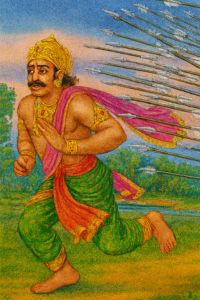
Krishna stood at the centre of the splendid Kuru court and spoke loud and clear, his voice ringing with righteous anger. But his pleas for peace fell on deaf ears. As expected, the Kauravas led by Duryodhana were in no mood to “settle” for anything less than war, and King Dhritarashtra wasn’t just physically blind but also chose not to see his son’s arrogance and greed. The Kuru elders, including Bhishma, Kripacharya, and Dronacharya, sitting in their grand chairs, looked on helplessly. They hung their heads in shame at their helplessness to convince Duryodhana. It was as if the universe was conspiring against peace and brotherhood.
Sage Parashurama watched the events unfolding, his ire matching that of Krishna’s. At this wit’s end, Krishna decided to make one final offer. He said, “My dear Duryodhana, just give the Pandavas five villages, Kusasthala, Vrikasthala, Makandi, Varanavata, and one other of your discretion, nothing more. The entire Bharatvarsha can avoid the bloody woes of war.”
Duryodhana’s voice replied, “Forget the five villages you just named, Krishna, we will not even give the land that covers the tips of five needles.”
All his brothers and friends roared in approval.
“War! War! War!” The Kuru court shuddered under the thundering calls for war.
Parashurama stood up and thumped down to the court, every step resonating with livid rage. Standing next to Krishna, he roared, “Duryodhana, your head seems ready to explode with misplaced optimism as your ego balloons at the blind and ignorant response of your sycophantic brothers and friends.”
The court was stunned into silence at the open attack on the crown prince from the revered sage. For a while, Duryodhana seemed to relent. But, in an instant, his face turned black with indignation, although he didn’t forget to bow down to the sage in reverence and said, “Sage Parashurama, you of all people should know that war is inevitable in a Kshatriya’s life. You picked up weapons even though you were born a Brahmin. So, you asking me to accept the peace proposal doesn’t sit well.”
Parashurama’s eyes burned at the brutal insult. Ignoring the personal jibe from Duryodhana, and controlling his own ire, he spoke in a gentle voice. “Let me tell you the story of Dambhodbhava, who learnt the lesson of humility the hard way.”
Krishna urged the sage, “Pray, tell us the story,” even as Duryodhana smirked.
The wise seer said, “Dambhodbhava was a powerful but vain ruler whose ambition was to prove he was the best warrior in the entire world. And so he went from kingdom to kingdom in search of warriors and powerful sages to challenge. He not only defeated all those he challenged but also humiliated them. His ego swelled with each victory, and he believed himself to be untouchable. Until he met his match in the divine duo, Nara and Narayana.”
The court was so silent listening to the sage’s story, you could hear a pin drop. He continued after a pause. “Despite having no intention to engage in any combat, Nara and Narayana decided to teach the arrogant man a lesson. They threw a few reeds of ishika grass into the sky, which then turned into thousands of arrows, all targeting the vain warrior. Fear writ large on his face, Damodhbhava ran as fast as he could. He looked quite a comical sight as he ran in panic, followed by a slew of arrows. In the end, exhausted, he begged Nara and Narayana to stop the onslaught, which they did. Thus, Dambhodbhava met his match, and his ego was crushed. Don’t be so naive that you don’t recognise Nara and Narayana in Arjuna and Krishna, Duryodhana,” the sage ended the story with a stern look at the eldest Kaurava.
Duryodhana’s haughty laughter rang through the court. He said, “Neither am I Dambodhbava nor do I want to prove my prowess. I only want what is mine. Uncle Pandu had left the kingdom to my father’s care, and so, it is but right that I get to be my father’s successor. The Pandavas have no right on the Kuru throne.”
Krishna looked defeated even as Sage Parashurama began to speak, in another effort to convince the Kauravas of the importance of peace. Krishna stopped the sage and said, “We’ve done all that we can, Sage Parashurama. Let us leave. It’s time to prepare for war.”
Krishna turned and left, and the sage followed him, but not before addressing the Kuru court, his voice ominous, “This will be a war of wars, and none but a few will survive. Most importantly, it will herald the end of Dwapara Yuga and the beginning of Kali Yuga, characterised by a steep decline in adharma and morality. I will have to helplessly watch the unstoppable decline for thousands of years before being released from my curse of immortality.”
Glossary
Nara and Narayana – the twin sages representing the eternal companionship between humans (Nara) and the divine (Narayana)
Ishika grass – a tall reed considered sacred in Hinduism
Author’s Note:
While the conversation between Krishna and Parashurama in the park is from my imagination, the fact that he was present in the court of Hastinapur during the final peace talks with Krishna, and his narration of the story of Damodbhava, are found in Vyasa’s Mahabharata.
This blog post is part of ‘Blogaberry Dazzle’
hosted by Cindy D’Silva and Noor Anand Chawla
in collaboration with Bohemian Bibliophile.

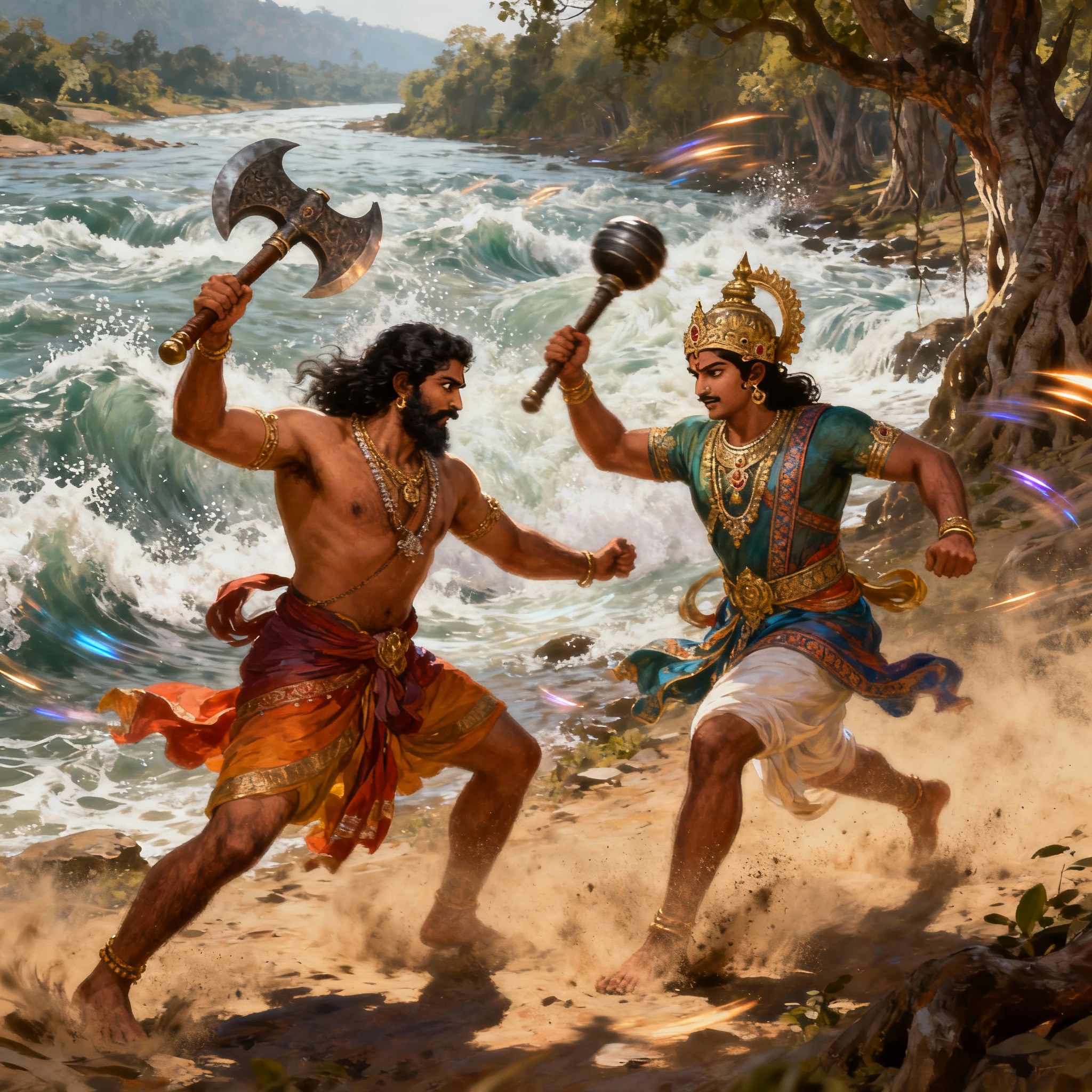
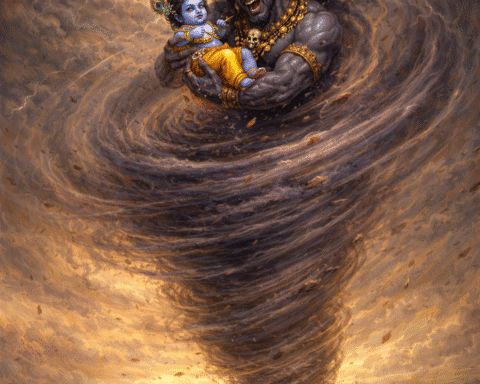
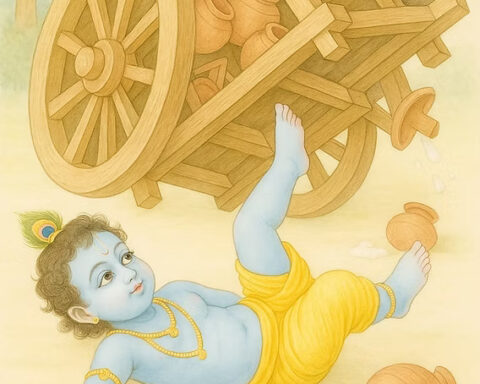
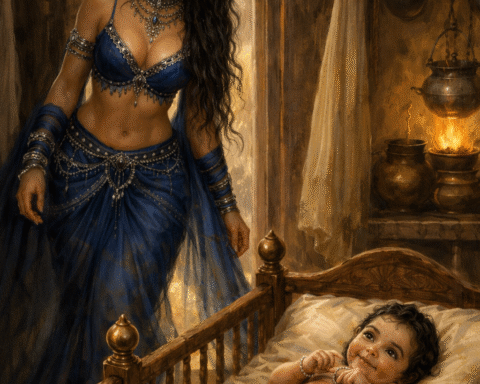
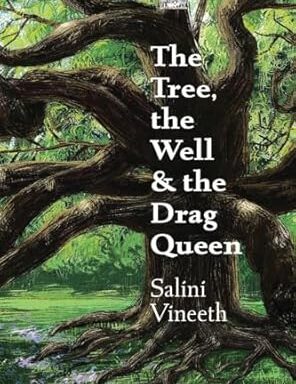
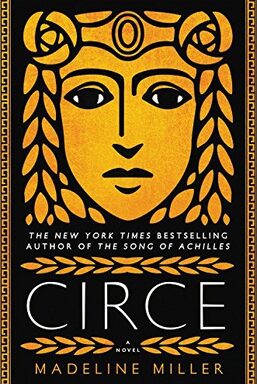
Thank you for bringing to us the story of Nar , Narayana and the conquering of Dambhodbhava. It is such a pleasure to envisage the Pauranik stories through your posts.
loved how you revisited Parashurama with nuance not just as a warrior sage but as someone wrestling with ideals of justice and peace. You made his contradictions feel human, and that tension is what gives myth its power. Thanks for offering a fresh lens on a legendary figure.
I loved how you revisited Parashurama with nuance not just as a warrior sage but as someone wrestling with ideals of justice and peace. You made his contradictions feel human, and that tension is what gives myth its power. Thanks for offering a fresh lens on a legendary figure.
The conversation is very interesting I must say. Krishna touching Parashurama’s feet and both striving for peace, though they knew it was futile. Very different take on the way the peace advice took off.
Parshuram has an image of being angry and egotistical. Your detailed post has shown that there is so much more to him than the attributes he is commonly known by.
I love the way you add a little snippet of yours to the mythology, park interlude between Parshuram and Krishna. You should compile an e-book from all your blogs and put it on Amazon Kindle.I am sure many readers will want to read.
Okay, so this is about a guy who had every reason to stay in his revenge era, but realized the real power move was choosing peace and balance instead. Honestly, the character development here is everything, and I am so here for it.
The idea of Parasuram has always been that of a vengeful and angry person. This post has added a new dimension to his character.
I got to know about Parashurama altogether in a new way and I really wonder how you do so much of research before penning such wonderful mythological stories? You are just amazing.
This was a detailed and an engaging story that I didn’t know if
.thanks for sharing this
I’m currently reading Bloodbath (The Empress of Indraprastha -Part 4) by Sonali Raje. It’s retelling of the epic Mahabharata from Draupadi’s PoV and in this book of the series we’re in the battle. I was recalling your post about Amba’s reincarnation as Shikhandi when Bhishma Pitamah fell. Your post on Amba helped me understand the scene’s intricacies better. And now I’m reading this post. These are such wonderful add-ons for someone like me who isn’t well-versed with the original text and is always interested in reading retellings. Thank you, Ratna for these posts and please continue doing this 🙂
I didn’t know the story of Damodbhava; thanks for sharing, Ratna.
Your storytelling brings the tension, atmosphere, and characters to life, blending myth, history, and emotion seamlessly.
I’ve always been fascinated with Parshuram’s character. His curse for Karna practically changed the entire direction of the war without him realising it at the time.
Most of us knows the story of last efforts done by ShriKrishna to avoid war. This is also depicted amazingly in Rashmirathi by Dinkar ji. However, this Parshuram episode was new for me. Thanks for telling this story!
Thank you, Aditya. Should check out Rashmirathi.